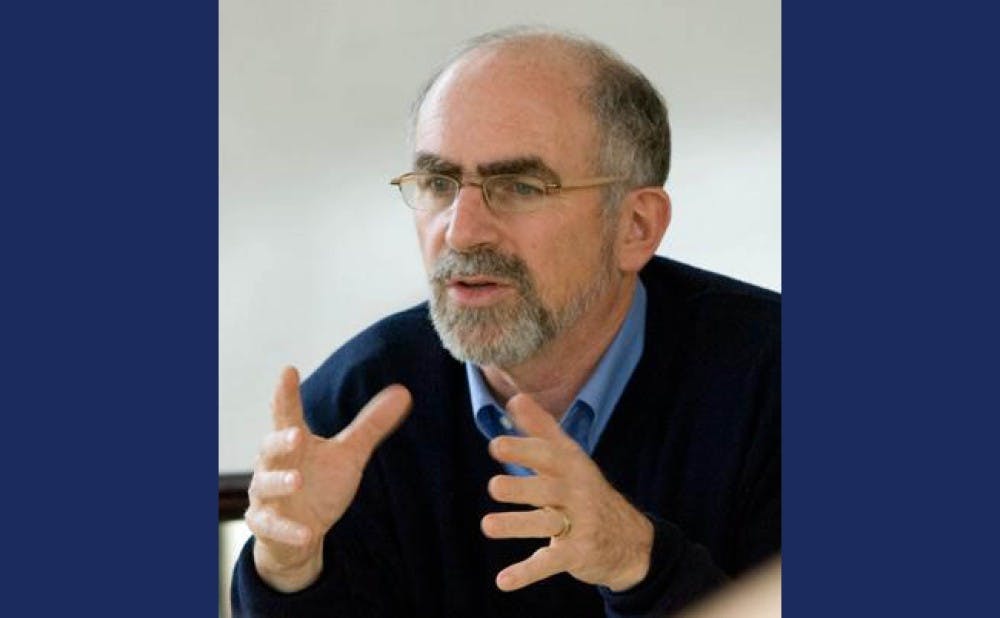The idea of “saving the liberal world order” from President Donald Trump’s rhetoric has recently been gaining traction in some media outlets and popular culture. But at a Center for International and Global Studies event Nov. 13, Bruce Jentleson, professor in the Sanford School of Public Policy, questioned whether the liberal world order needs saving.
Entitled "The End of the Liberal Order?" the event was moderated by Judith Kelley, dean of the Sanford School of Public Policy.
Jentleson noted that the term “post-war liberal world order” refers to the world order established at the end of World War II. This time period saw the creation of international institutions including the United Nations and World Trade Organization for multilateral cooperation. At the center of this—playing a leading roll among it all—was the United States, which ensured that democracy was pursued and promoted.
The so-called liberal world order was unstable even before Trump’s election, he explained.
“There were many parts of this world order [before Trump’s election] that were already crumbling in the economic system [and] in the international institutions that were created—many of them are underperforming,” Jentleson said. “The U.N. is clearly underperforming, many other programs are underperforming, democracy by then was a tarnished model, and the U.S. role as the system’s guarantor was being questioned particularly after the Iraq War around the world.”
He pointed to the 1956 Suez Crisis—when the United Kingdom, France and Israel invaded Egypt for nationalizing the Suez Canal—as a historical example highlighting the past effectiveness and significance of the United Nations in solving world problems. Dag Hammarskjöld, the U.N. secretary-general at the time, was able to step in and defuse the crisis before it potentially escalated into war.
“As secretary general, [Hammarskjöld] had more legitimacy as an international actor than any other,” Jentleson said. “But can you imagine a secretary-general being able to do that today? And we blame the U.N., we blame the secretary-general, but the reasons they can’t do it is because none of the major powers—not us, not the Chinese, not the Russians—will let them play this independent role. Yet the world really needs it.”
Thus Trump, he said, was an effect but not the cause of this crumbling world order. He argued that the problem is not a left or right issue, but more so an issue of fixing these problems that are destabilizing the world order, which would still be there even if Trump had not been elected.
“Why would we think that 70-plus years later, the same set of institutions, structures and roles for countries in the world, given how much change has happened in the world—the rise of China, changes in the developing world, various kinds of conflicts, climate change—that the same set of institutions would work going forward?'” Jentleson asked.
Therefore, he argued that America shouldn’t be “saving the liberal world order” as popularized media so often promotes. Instead, Jentleson put a focus on creating a new order of cooperation and security that reflects a modern world, one in which the United States rethinks its relationship with China and other countries that are becoming bigger actors.
“This is a world in which no country, not us, not China, dominates in the way that we and the Soviet Union dominated in the Cold War,” he said. “There are more countries that are now playing more roles than ever before.”
He also stressed the need to empower the United Nations and other international institutions to be bigger players in world affairs to help all countries including the United States. This is especially relevant in our current political climate revolving around the words “nationalism” and “sovereignty,” he added.
In fact, Jentleson noted that every country’s sovereignty is enhanced by giving up a little to international institutions and letting them solve the issues that individual countries can’t solve on their own. Even robust domestic policies cannot solve global problems like climate change, terrorism and pandemics. Instead, collective, multilateral cooperation from a range of actors, both other countries and other international institutions, is necessary.
“The great irony of this age in which people are making political games about pushing on the sovereignty issue is that it actually makes you less secure and makes you less prosperous,” he said. “We have to really try to figure out how to make [international institutions] more effective.”
In addition, he predicted that the “international economic system that emerges is going to be a hybrid.” As of now, there is no longer a real “model” for democracy around the world—democracy is receding.
For example, Jentleson noted that China has adapted—rather than adopted—capitalism. India has become more free-market and less bureaucratic, but the role of the government in the economy is still significant, and the northern European countries have a socialist-democratic model.
Despite the difficulties and uncertainties before us, Jentleson remarked that today's age is an exciting one.
“It’s an incredibly exciting time. It reminds me of the late 1940s where a lot of big questions were opened [like nuclear weapons, promoting trade]. And for a period in the ensuing decades, to a certain extent, we kind of all accepted the questions, we debated the answers," he said. "So I think now, it’s really exciting both intellectually and policy[wise], because we’re not sure what the questions are and what the answers are, and we’re really very much in need of a lot of creative thinking.”
Get The Chronicle straight to your inbox
Signup for our weekly newsletter. Cancel at any time.

Mona Tong is a Trinity senior and director of diversity, equity and inclusion analytics for The Chronicle's 117th volume. She was previously news editor for Volume 116.

